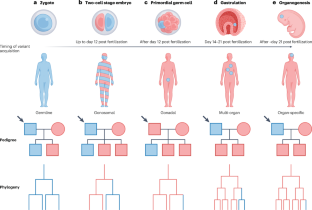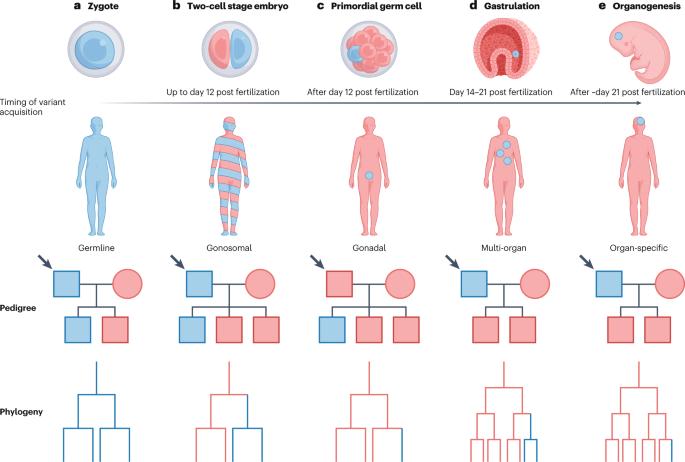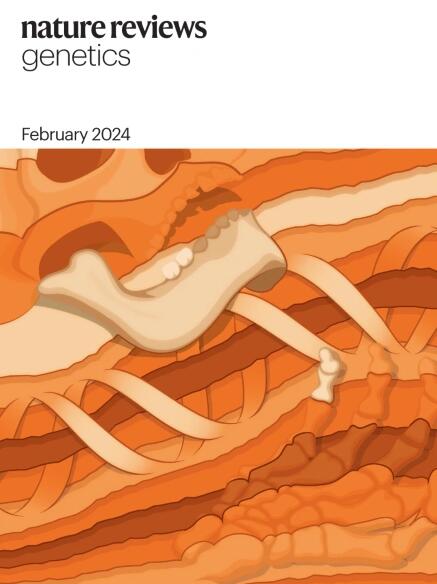Human embryonic genetic mosaicism and its effects on development and disease
IF 39.1
1区 生物学
Q1 GENETICS & HEREDITY
引用次数: 0
Abstract
Nearly every mammalian cell division is accompanied by a mutational event that becomes fixed in a daughter cell. When carried forward to additional cell progeny, a clone of variant cells can emerge. As a result, mammals are complex mosaics of clones that are genetically distinct from one another. Recent high-throughput sequencing studies have revealed that mosaicism is common, clone sizes often increase with age and specific variants can affect tissue function and disease development. Variants that are acquired during early embryogenesis are shared by multiple cell types and can affect numerous tissues. Within tissues, variant clones compete, which can result in their expansion or elimination. Embryonic mosaicism has clinical implications for genetic disease severity and transmission but is likely an under-recognized phenomenon. To better understand its implications for mosaic individuals, it is essential to leverage research tools that can elucidate the mechanisms by which expanded embryonic variants influence development and disease. Genetic variants acquired early during embryogenesis can affect numerous tissues. The authors review the phenomenon of embryonic mosaicism, with a focus on small variants, and discuss mechanisms of cell competition that allow mosaic clones to expand, as well as the functional consequences of mosaicism for embryo viability and the health of the organism.


人类胚胎基因嵌合及其对发育和疾病的影响
几乎哺乳动物的每一次细胞分裂都伴随着突变事件,这种突变会在子细胞中固定下来。当这种突变延续到其他细胞后代时,就会出现变异细胞克隆。因此,哺乳动物是由基因不同的克隆组成的复杂镶嵌体。最近的高通量测序研究发现,镶嵌现象很常见,克隆的大小通常会随着年龄的增长而增加,特定的变异会影响组织功能和疾病的发展。在早期胚胎发生过程中获得的变异由多种细胞类型共享,可影响多种组织。在组织内部,变异克隆会相互竞争,从而导致其扩大或消失。胚胎嵌合对遗传病的严重性和传播有临床影响,但这一现象可能未得到充分认识。为了更好地了解其对马赛克个体的影响,必须利用研究工具来阐明胚胎变异扩增对发育和疾病的影响机制。
本文章由计算机程序翻译,如有差异,请以英文原文为准。
求助全文
约1分钟内获得全文
求助全文
来源期刊

Nature Reviews Genetics
生物-遗传学
CiteScore
57.40
自引率
0.50%
发文量
113
审稿时长
6-12 weeks
期刊介绍:
At Nature Reviews Genetics, our goal is to be the leading source of reviews and commentaries for the scientific communities we serve. We are dedicated to publishing authoritative articles that are easily accessible to our readers. We believe in enhancing our articles with clear and understandable figures, tables, and other display items. Our aim is to provide an unparalleled service to authors, referees, and readers, and we are committed to maximizing the usefulness and impact of each article we publish.
Within our journal, we publish a range of content including Research Highlights, Comments, Reviews, and Perspectives that are relevant to geneticists and genomicists. With our broad scope, we ensure that the articles we publish reach the widest possible audience.
As part of the Nature Reviews portfolio of journals, we strive to uphold the high standards and reputation associated with this esteemed collection of publications.
 求助内容:
求助内容: 应助结果提醒方式:
应助结果提醒方式:


